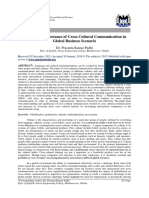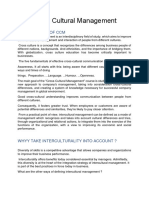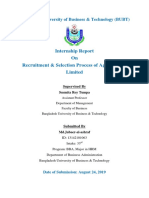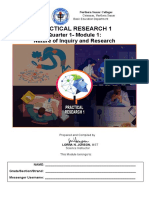IBC201
IBC201
Uploaded by
vanlttds170181Copyright:
Available Formats
IBC201
IBC201
Uploaded by
vanlttds170181Original Description:
Copyright
Available Formats
Share this document
Did you find this document useful?
Is this content inappropriate?
Copyright:
Available Formats
IBC201
IBC201
Uploaded by
vanlttds170181Copyright:
Available Formats
Full name: Lê Thị Thảo Vân
ID: DS170181
Class: IB17D03
Lecture: Nguyễn Mai Hoàng Vy
Organizations that oversee relationships and proactively bridge
cultural divides require particular attention in the current globalized
business environment. Business culture alignment requires an
understanding, mastery, and effective management of these
differences. Thus, in the age of global connectivity, it is crucial to grasp
cross-cultural management and negotiation in an international business
setting if one hopes to succeed. The purpose of this article is to analyze
cross-cultural management's opportunities and challenges and offer
suggestions for businesses that operate in foreign markets.
A major obstacle in cross-cultural management is effective
communication. Languages, writing styles, and communication
methods vary throughout cultures. These disparities make it simple for
communication in cross-cultural management to lead to
miscommunications and disputes. several issues with communication.
One could argue that miscommunication can happen during
discussions between people from various cultural backgrounds. As a
result, effective communication is crucial for cross-cultural
management, negotiation, and global integration in an international
business setting.
Another strategy for resolving cultural differences is multicultural
management. Gaining an understanding of the traits of culture enables
us to view it accurately and carefully, which in turn allows us to
comprehend how culture manifests itself in social interactions in
general and in business dealings in particular.
Culture is not something that exists naturally; rather, it is a human
creation that takes decades to develop rather than emerging overnight.
Culture is the collection of ideas, emotions, and behaviors that are
inherited from one generation to the next and are the outcome of many
years of life experience. Every generation contributes something fresh
to the legacy of culture that their forebears left behind. It is through
values, attitudes, ideas, customs, and symbols that cultural patterns are
passed along. Cultural standards are the outcome of identifying and
controlling behavior that is not acceptable.
A group, nation, or people's values, norms, beliefs, and customs are
collectively referred to as their culture. Every culture has unique traits,
as well as distinct methods of acting, thinking, and communicating.
Consequently, managing in a diverse workplace that encompasses a
range of cultural origins, faiths, languages, and value systems is known
as multicultural management.
I'll start by examining potential difficulties with cross-cultural
management.
The first point that should be made is the diversity of cultures; every
culture has its own norms, values, and customs. As a result, there could
be misconceptions regarding certain deeds or remarks made by others.
Organizations can prevent misunderstandings through understanding
cultural differences. Next up is mindset. When managing cross-
culturally, another problem is each person's attitude toward another
person's culture. Workers' nationalistic or racial views could obstruct
dialogue. In terms of international challenges, if the company operates
beyond borders, it must extensively expose itself to many cultures in
order to adapt.
To solve the above problems, i give recommendations:
Adjusting human resources and recruitment policies: Companies need
to pay attention to adjusting human resources and recruitment policies
to be able to attract employees from many different countries and
cultures. Organisations need to train their employees with the
necessary knowledge and skills to better understand different cultures
and how to communicate effectively with people of different cultures
and backgrounds. different nationalities. I offer the following solutions
to the aforementioned issues:
Changing recruitment and human resource practices is organisations
that want to hire people from a wide range of nationalities and cultures
must be mindful of changing recruitment and human resource practices.
Employers must provide their staff with the knowledge and abilities
needed to better understand other cultures and know how to interact
and communicate with individuals from a variety of backgrounds and
cultures. various nationalities. In order to improve their capacity to
react to market changes quickly and make necessary adjustments to
business policies, organizations must regularly evaluate and assess
their cross-cultural management capabilities. In the future, the world
will grow more and more developed. In order to improve their capacity
to react to market changes quickly and make necessary adjustments to
business policies, organizations must regularly evaluate and assess
their cross-cultural management capabilities. In the future, the world
will grow more and more developed.
In short, gaining an understanding of cross-cultural management
facilitates the development of a harmonious network of various
cultural backgrounds, which creates the ideal environment for global
integration.suggestions for businesses that deal with global markets.
benefits of multicultural
management:https://www.thomas.co/resources/type/hr-
blog/importance-cultural-diversity-workplace
You might also like
- EFB Relection PaperDocument6 pagesEFB Relection PaperAdolf AgieNo ratings yet
- DOC-20241229-WA0008.Document9 pagesDOC-20241229-WA0008.Haniel PaulNo ratings yet
- Cross Cultural Communication BarriersDocument2 pagesCross Cultural Communication BarriersAnonymous 3L7ZroJIzhNo ratings yet
- DocumentDocument10 pagesDocumentCorine Cometa ColorNo ratings yet
- Cross Cultural CommunicationDocument1 pageCross Cultural Communicationshivasoni898909No ratings yet
- The Rising Importance of Cross Cultural Communication in Global Business ScenarioDocument7 pagesThe Rising Importance of Cross Cultural Communication in Global Business ScenarioAndreea DobritaNo ratings yet
- The Importance of Cultural Awareness in Global CommunicationDocument2 pagesThe Importance of Cultural Awareness in Global Communicationxahativ294No ratings yet
- Purposive Communication ReportingDocument14 pagesPurposive Communication ReportingJommel TejereroNo ratings yet
- The Importance of Understanding Culture in International BusinessDocument5 pagesThe Importance of Understanding Culture in International BusinesswaqasrehmanNo ratings yet
- Ibc - Cross Cultural Management and NegotiationDocument4 pagesIbc - Cross Cultural Management and Negotiationpromisecupi2No ratings yet
- Purposive-Communication-Reporting Group 1Document17 pagesPurposive-Communication-Reporting Group 1Jommel TejereroNo ratings yet
- Cross Cultural Management ThesisDocument6 pagesCross Cultural Management Thesispzblktgld100% (2)
- The Ear of The Leader Must Ring With The Voices of The PeopleDocument10 pagesThe Ear of The Leader Must Ring With The Voices of The PeopleHina Safarish GillNo ratings yet
- Cross Culture ManagmentDocument8 pagesCross Culture ManagmentUjjwal AnandNo ratings yet
- Business Communication AssignmentDocument19 pagesBusiness Communication AssignmentOmar FarukNo ratings yet
- Order ID 365233484 Helping An International Friend - EditedDocument8 pagesOrder ID 365233484 Helping An International Friend - Editedwabomba elphasNo ratings yet
- Studying The Influence of Cross-Cultural Difference On International MarketingDocument8 pagesStudying The Influence of Cross-Cultural Difference On International MarketingLiza SenguptaNo ratings yet
- Managing Cultural Differences For Competitive AdvantageDocument7 pagesManaging Cultural Differences For Competitive Advantagearcherselevators100% (1)
- Int. MangementDocument8 pagesInt. MangementMinna KhalidNo ratings yet
- Seatwork No. 1 - Culture and IBTDocument1 pageSeatwork No. 1 - Culture and IBTland YiNo ratings yet
- Cross CulturalDocument17 pagesCross CulturalAparna HemanthNo ratings yet
- Cross Cultural Communication AssignmentDocument6 pagesCross Cultural Communication AssignmentareeNo ratings yet
- Managing Cultural Diversity in The WorkplaceDocument2 pagesManaging Cultural Diversity in The WorkplaceLorenz ValenciaNo ratings yet
- Cross Cultural CommunicationDocument9 pagesCross Cultural CommunicationIndra Bahadur SinghNo ratings yet
- HRPDDocument16 pagesHRPDPartha SarathiNo ratings yet
- Cultural Differences and Marketing Strategy Case Study On Indian Cultural ContextDocument9 pagesCultural Differences and Marketing Strategy Case Study On Indian Cultural ContextBrijlal MallikNo ratings yet
- Cross Cultural Management 1Document6 pagesCross Cultural Management 1Mialy RabemanantsoaNo ratings yet
- Full Table of Contents18f23e61bf8tAIF 2Document3 pagesFull Table of Contents18f23e61bf8tAIF 2Hoàng Kim ThuýNo ratings yet
- Cultural Communication Barriers in The WorkplaceDocument4 pagesCultural Communication Barriers in The WorkplaceHoroba DanielNo ratings yet
- Culture in The WorkplaceDocument3 pagesCulture in The WorkplaceNash HechanovaNo ratings yet
- Global Cultural Environment and Buying BehaviorDocument3 pagesGlobal Cultural Environment and Buying BehaviorDonna LouisaNo ratings yet
- Unit-2-Culture and International BusinessDocument42 pagesUnit-2-Culture and International BusinessJean DuboisNo ratings yet
- Cultural Aspects of Global CommunicationDocument14 pagesCultural Aspects of Global CommunicationVidushi Gautam100% (2)
- Assignment (EMBA-190382)Document5 pagesAssignment (EMBA-190382)Shaikat D. AjaxNo ratings yet
- Intercultural CommunicationDocument4 pagesIntercultural CommunicationlilychengmiNo ratings yet
- Cross Cultural Management Master ThesisDocument4 pagesCross Cultural Management Master Thesismichelleandersonomaha100% (2)
- The Business Case For Managing Cultural DiversityDocument10 pagesThe Business Case For Managing Cultural Diversityhapalo taigaNo ratings yet
- Cultural Differences Must Be Evaluated by An Organisation When Competing in Global MarketsDocument5 pagesCultural Differences Must Be Evaluated by An Organisation When Competing in Global Marketsاسامه سنكرNo ratings yet
- Impact of Culture On International Business 1Document8 pagesImpact of Culture On International Business 1Shashwat ShuklaNo ratings yet
- Cross Cultural Management Dissertation TopicsDocument8 pagesCross Cultural Management Dissertation TopicsProfessionalPaperWritingServiceManchester100% (1)
- Mini Project On Cross Culture in MNC'S: Subitted by P.Kalyan Kamalesh B.V.Karthik MohanrajDocument17 pagesMini Project On Cross Culture in MNC'S: Subitted by P.Kalyan Kamalesh B.V.Karthik MohanrajKarthik ReddyNo ratings yet
- Meriatul Qibtiyah 125020302111004 Paper 2Document2 pagesMeriatul Qibtiyah 125020302111004 Paper 2meriatulqibtiyahNo ratings yet
- English of Business s3 c2.3.4.5.6Document18 pagesEnglish of Business s3 c2.3.4.5.6baazizlamis7No ratings yet
- Chapter 2 - Cross-Cultural Management SkillsDocument26 pagesChapter 2 - Cross-Cultural Management Skillsfatematuj johoraNo ratings yet
- Intercultural Communication Strategies For Business CommunicationsDocument8 pagesIntercultural Communication Strategies For Business CommunicationsAradhana KumariNo ratings yet
- Effective Cross-Cultural Communication For International BusinessDocument8 pagesEffective Cross-Cultural Communication For International BusinessHunza NadeemNo ratings yet
- UntitledDocument4 pagesUntitledscmb14No ratings yet
- Im Cultural DivDocument73 pagesIm Cultural DivJocel Rose TorresNo ratings yet
- The global mindset: A roadmap to intercultural competence in businessFrom EverandThe global mindset: A roadmap to intercultural competence in businessNo ratings yet
- Intercultural Team Management. GTECH CorporationDocument13 pagesIntercultural Team Management. GTECH CorporationMateusz PiszczekNo ratings yet
- Cultural Awareness and InclusionDocument28 pagesCultural Awareness and InclusionNisha MalhotraNo ratings yet
- A Study On The Significant Role of Cross Cultural Communication in Business Firms Gagandeep KaurDocument9 pagesA Study On The Significant Role of Cross Cultural Communication in Business Firms Gagandeep KaurAbdo ElhabashyNo ratings yet
- Intercultural Communication Thesis IdeasDocument6 pagesIntercultural Communication Thesis Ideasafbsyebpu100% (2)
- Cultural and Global DiversityDocument5 pagesCultural and Global DiversityDr Linda Mary SimonNo ratings yet
- Module 6-7. Cross - Cultural Issues in Servqual. (THCC 216)Document4 pagesModule 6-7. Cross - Cultural Issues in Servqual. (THCC 216)MARITONI MEDALLANo ratings yet
- Kepelbagaian Di Tempat KerjaDocument3 pagesKepelbagaian Di Tempat KerjaNanthakumar SubramanianNo ratings yet
- Executive Summary Cross-Cultural/International CommunicationDocument2 pagesExecutive Summary Cross-Cultural/International CommunicationDwitya AribawaNo ratings yet
- The importance of culture in businessDocument5 pagesThe importance of culture in businessYASSMINA DRIDOUNo ratings yet
- Fawad SikanderDocument8 pagesFawad SikanderYounus AliNo ratings yet
- استخدام نظام SPSS في تحليل البيانات الإحصائية د محمود خالد عكاشةDocument38 pagesاستخدام نظام SPSS في تحليل البيانات الإحصائية د محمود خالد عكاشةfethi.hammou100% (1)
- Leadership and Personal DevelopmentDocument9 pagesLeadership and Personal Developmentapi-584197396No ratings yet
- Introduction To Artificial Intelligence: Chapter 3: Kwoledge Representation and Reasoning (1) Logic AgentsDocument32 pagesIntroduction To Artificial Intelligence: Chapter 3: Kwoledge Representation and Reasoning (1) Logic AgentsQuynh Nhu Tran ThiNo ratings yet
- Formalities-3ta-Jubaer-01764118443Document8 pagesFormalities-3ta-Jubaer-01764118443Riyad HossainNo ratings yet
- Cleaner Logistics and Supply ChainDocument8 pagesCleaner Logistics and Supply ChainArash HasandokhtNo ratings yet
- PracRes Additional Notes 2Document11 pagesPracRes Additional Notes 2EllyNo ratings yet
- DLL MTB-2 Q2 W3Document4 pagesDLL MTB-2 Q2 W3Christine Joy PajelaNo ratings yet
- Churn Rate DPVDocument15 pagesChurn Rate DPVDhairya MehtaNo ratings yet
- SeminarDocument16 pagesSeminarPallavi BhartiNo ratings yet
- 2021 06 03 MCQ Specifications.V0.5Document27 pages2021 06 03 MCQ Specifications.V0.5HimanshuNo ratings yet
- An Introduction To Medical Teaching: Kathryn N. Huggett Kelly M. Quesnelle William B. Jeffries EditorsDocument344 pagesAn Introduction To Medical Teaching: Kathryn N. Huggett Kelly M. Quesnelle William B. Jeffries EditorsGonzalo Acosta100% (2)
- Spray PyrolysisDocument16 pagesSpray Pyrolysisamel ammamNo ratings yet
- Jurnal Untuk Tugas ReviewDocument15 pagesJurnal Untuk Tugas ReviewDian Ayu Mustika NingtyasNo ratings yet
- BCA SemWise DseuDocument5 pagesBCA SemWise DseuSakshi Bansal100% (1)
- Tribhuvan University Faculty of Humanities and Social Sciences A Project Proposal On "Student Management System"Document2 pagesTribhuvan University Faculty of Humanities and Social Sciences A Project Proposal On "Student Management System"Jitendra chaudharyNo ratings yet
- Accomplishment Report in MathematicsDocument7 pagesAccomplishment Report in MathematicslomarNo ratings yet
- Ed 4 Module 11 Learners With Additional Needs (Part 3)Document51 pagesEd 4 Module 11 Learners With Additional Needs (Part 3)Ann Margarette BernardinoNo ratings yet
- Film Director ResearchDocument210 pagesFilm Director ResearchマルワNo ratings yet
- Mmpa F Modular Program Proj Devt MGT 28oct2023Document2 pagesMmpa F Modular Program Proj Devt MGT 28oct2023khimdarkNo ratings yet
- Synthesis Matrix For Established Theories of LearningDocument6 pagesSynthesis Matrix For Established Theories of LearningReyArañoSandovalNo ratings yet
- Jurnal Cluster Randomised CT Dan CONSORT (Shelly, Yuliarni, Anita, Dwi Mayang, Dicky, Alamsyah)Document11 pagesJurnal Cluster Randomised CT Dan CONSORT (Shelly, Yuliarni, Anita, Dwi Mayang, Dicky, Alamsyah)shelly juliskaNo ratings yet
- Three Part Lesson TemplateDocument5 pagesThree Part Lesson Templateapi-725921276No ratings yet
- Home Economics Philosophy (Ies) : Sue L. T. McgregorDocument31 pagesHome Economics Philosophy (Ies) : Sue L. T. McgregorJOBELLE OCANANo ratings yet
- Mcshane 10e PPT Ch15 AccessDocument27 pagesMcshane 10e PPT Ch15 Accesstakiyaaydil97No ratings yet
- Practical Research 1 - Quarter 1 - Module 1 - Nature and Inquiry of ResearchDocument55 pagesPractical Research 1 - Quarter 1 - Module 1 - Nature and Inquiry of ResearchFranz JonsonNo ratings yet
- Evans (1999)Document38 pagesEvans (1999)Kh TNo ratings yet
- Impact - of - Sexual - Content - in - AdDocument11 pagesImpact - of - Sexual - Content - in - AdHello KiddoNo ratings yet
- PhIMO MATRIXDocument13 pagesPhIMO MATRIXatescandor100% (1)
- Heutagogyand Complexity TheoryDocument9 pagesHeutagogyand Complexity TheoryMohamad AfiqNo ratings yet
- Bade Construction Company: About MeDocument1 pageBade Construction Company: About MeAbdiwahab Hassan AliNo ratings yet

























































































